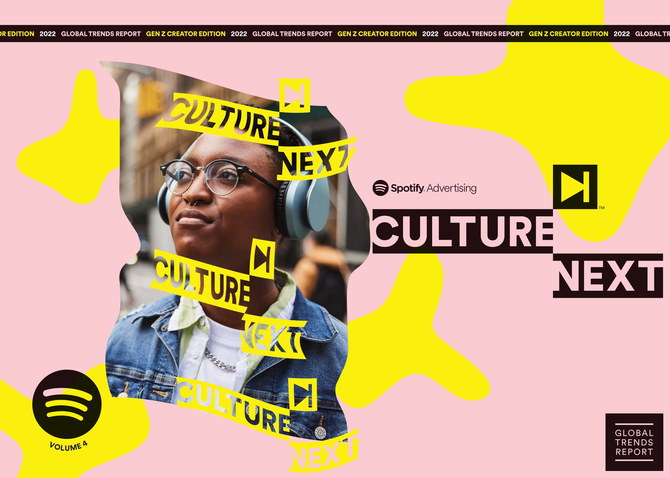DUBAI: Spotify has released the UAE edition of its annual global culture and trends report, Culture Next.
In the fourth edition of the report, the second to feature the UAE, Spotify delves deeper into the behaviors, attitudes and mindsets of their largest audience segment, Generation Z (aged 15 to 25), and how they differ from Generation Y, known as millennials (26 to 40).
In 2021, Gen Zs globally streamed music more often than they used any other media (including videos, games, and TV), and shared more Spotify playlists and engaged in more group listening sessions than any other generation, according to the report.
In the first quarter of 2022 alone, 18 to 24-year-olds have played more than 578 billion minutes of music on Spotify — more than any other segment, and roughly 16 billion more minutes than millennials, or 25 to 34-year-olds, around the world.
“Audio has always been part of our lives,” Mark Abou Jaoude, Spotify’s head of music in the Middle East and North Africa, told Arab News.
“Streaming is being seen more and more as a key driver for discovery and the formation of a global community that identifies with one another through audio. It’s a way of self-expression and it's screenless,” he added.
Video, as a format, has grown in popularity in recent times, spurred by short-form video such as that on TikTok and Instagram’s Reels.
Jaoude, however, stresses the importance of audio, particularly for Gen Zs. “A video with no audio is hard to comprehend, for example, but a pure audio piece is not. Audio enriches storytelling,” he said.
The report highlights key differences between Gen Zs and millennials, with the former having gone from an “emerging” generation to the “center stage of culture.”
Firstly, while both generations are stressed, Gen Zs are more so. “Millennials were raised in a boom, Zs in a bust,” said Jaoude. They have experienced significant downturns associated with the crash of 2008 and later COVID-19, which they experienced mostly as adults, he explained.
In this environment, they are turning to audio as a safe space. Fifty-nine percent of 18 to 24-year-olds in the UAE said they turn to podcasts to get answers to hard or personal questions before talking to their families about it, and 66 percent said they listen to podcasts to inform the conversations they have with their friends.
Moreover, according to 68 percent of Gen Zs in the UAE, audio helps them understand themselves better, and 80 percent said it allows them to explore different sides of their personality.
All of this means that for Gen Zs, audio has always been a part of their lives, and they use it for everything from creativity and self-expression, to discovering aspects of their own personality.
The second factor setting Gen Zs apart is that they are “the most racially and culturally diverse generation and therefore they demand this diversity be reflected through their lifestyle, the brands they engage with, social media and the audio they consume,” according to Jaoude.
Self-expression and creativity are core to this generation and so, “they lean into music, artists, podcasts, and playlists to shape the stories they tell about themselves,” he added.
FASTFACTS
• 66 percent listen to podcasts to inform the conversations they have with their friends.
• 82 percent said they had learned something about themselves by looking back on their listening habits.
• 74 percent believe that their listening habits tell a story about who they are.
• 78 percent listen to music from movies or shows because they like to feel like they are a character in the story.
• 71 percent like listening to and watching media from earlier decades because it reminds them of when things were simpler.
• 75 percent like it when brands bring back old aesthetic styles.
• 72 percent love it when brands produce retro products or content.
For instance, 82 percent in the UAE said they had learned something about themselves by looking back on their listening habits, and 74 percent believe that their listening habits tell a story about who they are.
It might appear that they are self-involved, but according to the report, they are driving the “main-character energy” trend, in which people use social media or digital audio to make themselves feel like the center of attention. This is evident in the popularity of playlists like “My Life is a Movie” and ones containing “POV” in the title.
Seventy-eight percent of Gen Zs in the UAE listen to music from movies or shows because “they like to feel like they are a character in the story,” according to Jaoude, and 79 percent of all Spotify playlists globally with “POV” in the title were created by Gen Zs.
Jaoude said: “They are experts in structuring and communicating their individual stories through playlists. They create their own playlists on Spotify and even use collaborative playlist features to ask their friends and community to exchange songs.”
While millennials are known for being nostalgic, Gen Zs go even further down memory lane, he added. They are “reinventing nostalgia” by filtering pop culture “through a contemporary perspective to access and inspire something new and unique to them,” he said.
Millennials are nostalgic for the times they have lived through; Gen Zs, on the other hand, are nostalgic for eras that offer some form of reprieve from current times, which they find stressful and anxiety-inducing.
“Among Zs, the past is all fuel for the future — and that is true for more than music,” Jaoude said.
It is why 71 percent of Gen Zs in UAE said they like listening to and watching media from earlier decades — because it reminds them of when things were simpler, and 75 percent like it when brands bring back old aesthetic styles, while 72 percent love it when brands produce retro products or content.
“You will see that movement in today’s fashion and the sound of music; there’s a lot of borrowing from previous eras and artists add their personal flair or vision to that sound,” said Jaoude.
Gen Zs’ unique problems, and habits, provide an untapped opportunity for marketers. As Jaoude said: “They are seeking new opportunities to share themselves through audio — and looking to brands to help make it happen.”
Forty-nine percent in the UAE said they like being able to select the ad they listen to on a digital audio streaming service, and more than a third said they like it when they can interact with ads.
For example, Spotify worked with Adidas on the “Nite Jogger” campaign where they created a custom digital experience that gleaned the “sonic traits” of listeners’ nighttime streaming activity to create a custom playlist unique to each individual. The campaign racked up 32.4 million impressions and over 9 million unique visitors.
“While brands of the past may have prioritized keeping an iron grip over their messaging, there’s a huge opportunity to connect with the next generation by handing the reins over to them and allowing them to customize their experience — especially in the space of audio,” said Jaoude.

















